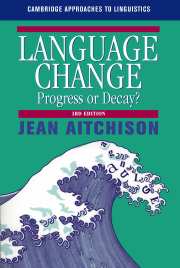Book contents
- Frontmatter
- Contents
- Preface
- Part 1 Preliminaries
- Part 2 Transition
- Part 3 Causation
- 10 The reason why
- 11 Doing what comes naturally
- 12 Repairing the patterns
- 13 The Mad Hatter's tea-party
- Part 4 Beginnings and endings
- Symbols and technical terms
- Notes and suggestions for further reading
- References
- Acknowledgments
- Index
10 - The reason why
Sociolinguistic causes of change
from Part 3 - Causation
- Frontmatter
- Contents
- Preface
- Part 1 Preliminaries
- Part 2 Transition
- Part 3 Causation
- 10 The reason why
- 11 Doing what comes naturally
- 12 Repairing the patterns
- 13 The Mad Hatter's tea-party
- Part 4 Beginnings and endings
- Symbols and technical terms
- Notes and suggestions for further reading
- References
- Acknowledgments
- Index
Summary
Phaedrus … had noticed again and again … that what might seem to be the hardest part of scientific work, thinking of the hypotheses, was invariably the easiest … As he was testing hypothesis number one by experimental method a flood of other hypotheses would come to mind … At first he found it amusing. He coined a law intended to have the humour of a Parkinson's law that ‘The number of rational hypotheses that can explain any given phenomenon is infinite’. It pleased him never to run out of hypotheses … It was only months after he had coined the law that he began to have some doubts about the benefits of it … If the purpose of scientific method is to select from among a multitude of hypotheses, and if the number of hypotheses grows faster than experimental method can handle, then it is clear that all hypotheses can never be tested …
Robert Pirsig, Zen and the art of motorcycle maintenanceFor centuries, people have speculated about the causes of language change. The problem is not one of thinking up possible causes, but of deciding which to take seriously. In the quotation above, Phaedrus, a scientist, is overwhelmed by the number of possible theories which come to mind in his work on physics.
- Type
- Chapter
- Information
- Language ChangeProgress or Decay?, pp. 133 - 152Publisher: Cambridge University PressPrint publication year: 2000

